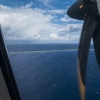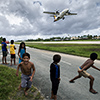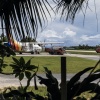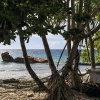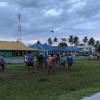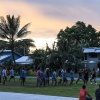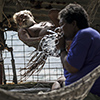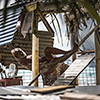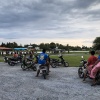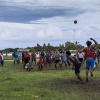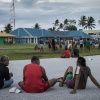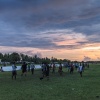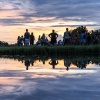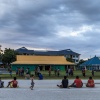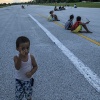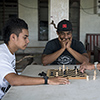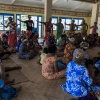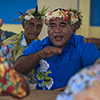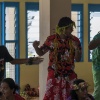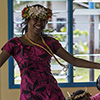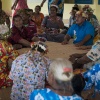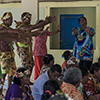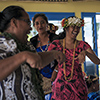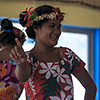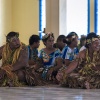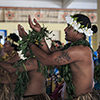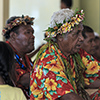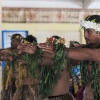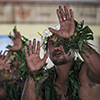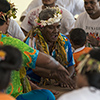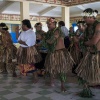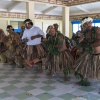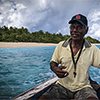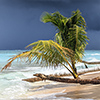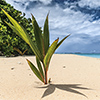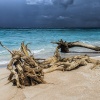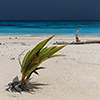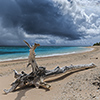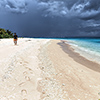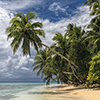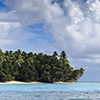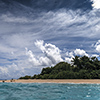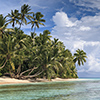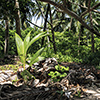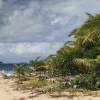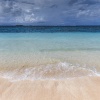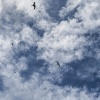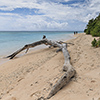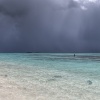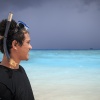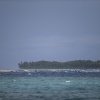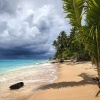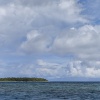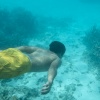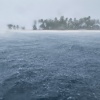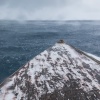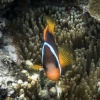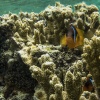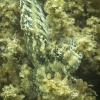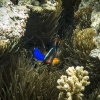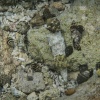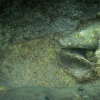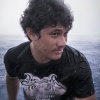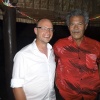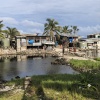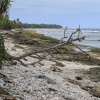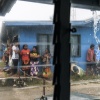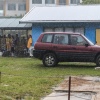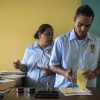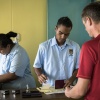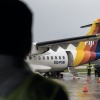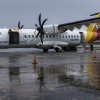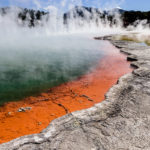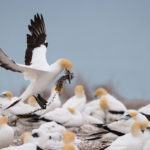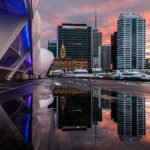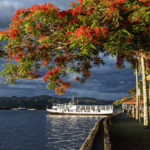Living at the Landing Strip – The Tuvalu Atoll
Having a look at its actual landmass, Tuvalu is the second smallest nation in the world. Some of its islands are so tiny and narrow that you can literally spit from one side to another. The heart of Tuvalu is the Funafuti atoll being embraced in the east by the main island Fongafale. Airplanes can land there, on the highest spot of the nation, which is 5 metres above sea level. Along that airstrip the life of Funafuti atoll takes place and even if islands are generally pretty limited, Tuvalu gave me the most important moment of authentic Polynesian culture along with a dinner with the Prime Minister.
Monotonously buzzing to itself, the turboprop machine of Pacific Sun flies over the Pacific Ocean providing nothing but an outlook to clouds and blue water for hours. Suddenly things run fast though: seat belt sign, descent and *bump* we land on a palm-tree-lined heap of sand in the middle of the sea. “Welcome to Funafuti airport” says the lady while we taxi along the firefighters forming a guard of honour; standing there from pure precaution only as later it turns out that Tuvalu’s runway is an inherent part of the island life.
Having barely left the airplane, one of the tiniest international airports in the world receives me. Arrival and departures, immigration and emigration, tears of farewell as well as reunion – all that happens under one little blue roof, in a small blue shack. The airplane doesn’t refuel and picks up passengers only to immediately restart again back to Fiji while local kids try to keep the plane’s pace by running mafficking along the airstrip.
Tuvalu is very small. Some of its islands are so narrow that you can literally spit from one side to the other. It’s got a local radio station, but watching TV is not possible as the islands are not covered anymore anymore since the latest satellite adjustment. The two people being imprisoned may go home to their families at the end of the day. My accommodation is right next to the airstrip. What sounds like bad aviation noises, is actually pretty relaxed as Tuvalu has no own airline and the one and only plane flying turns up just every couple of days. While the setting sun paints the sky fiery red, people flock to the airstrip to play volleyball, badminton or a local variety of a mix of rugby and volleyball using a very heavy ball that may not be touched more than three times. Other people enjoy the evening playing chess, card games or only watching other people having fun.
I have a stroll about the main island Fongafale and again it is the South Sea typical singing that draws my attention. Inside a hall directly at the shore I may witness a big family reunion; and what a fabulous reunion that was… After all it was the purest moment of authentic Polynesian culture being enjoyed by locals and no touristic show. Two groups of colourfully dressed Polynesians battled each other a little bit by drumming, laughing and singing. Motto of the moment was joining in and coming out, no matter if male or female, old or young. Even if I am not a part of their life and don’t speak their language, their eyes and smiles immediately told me that I am very welcome and may watch their festivities. It is pure enjoyment to see their dances telling stories about island life, fishing, forces of nature or the arrival of the white man.
Tuvalu’s life happens at a leisurely pace and appears paralysed against the background of busy western world. Asking around what a really hard day means for the locals, I get the answer that waking up early means 9 o’clock and hard work happens from 10 till 12, from Monday to Thursday. Telling them what my daily hustle and bustle at work looks like, their eyes get big and jaws drop. Unfortunately Fongafale often is everything but picturesque, hence I quickly looked how to get to the outer islands. Eddy, a wide-travelled seaman working for Hamburg Süd helps me to get there as he knows Tuvalu and its people like the back of his hand. He organises a boat and a captain, whose first name is so complicated that I stick to calling him captain all the time. “Captain” is a waggish looking guy, but through and through friendly.
With an iron fist Captain holds the steering of the stoically rattling outboard engine puffing away countless cigarettes while sitting on our main fuel supply. With his healthy eye he stares at the backs of the palefaces he is about to bring to the other side of the atoll. The surf inside the lagoon is remarkable and lets the slowly water absorbing boat pitch making the wooden benches massage our buttocks. After almost two hours that joy sees an end as we reach the small outer islands of the Funafuti atoll. Already the first glance at those little pieces of paradise lets my heart beat faster. Some islands are literally only a heap of sand in the middle of nowhere providing barely more space than a standing cell in prison. Going ashore, by the first step my legs get immediately conquered by myriads of little red ants. Maybe it is not the paradise I was hoping for ;-)
Vegetation-wise one thing stands out everywhere, the winner of evolution, the coconut palm. Elder palms and their overhanging fronds offer shade while the very young ones drill themselves through white coral sand towards the sun. Other palms wind themselves through the thicket towards the daylight while at their feet, or better to say roots, the surf washes around palm remnants as well as flotsam. A heavenly scenery embraced by surreally intensive glowing water, my photographer heart beats faster. Step by step wind freshens and invites impressive man-o’-war birds, the air pirates of the Pacific, to sail away the day. Indulging myself in snorkelling I don’t pay attention how fast time goes by and that meanwhile severe weather formed behind me. Having experienced a couple of moments of thunder and lightning worldwide, I instantly realise that this black wall doesn’t bode any well, even when it’s meaning wonderful contrasts to my photos.
And then the storm descends upon us. Holy shit, what is coming from the sky is not normal… To boot my glorious fellow travellers have the wonderful idea of moving to another islands, through rain and rough waves on a slight leaking boat. Hooray, let’s cast off and away…! My mind’s eye already sees me filling in the photo insurance form and having a swim back. Somehow I stay relaxed, the Polynesian way, as there is nothing I can do at the moment.
“Captain” starts the engine, the motors rattles, we move through the waves, the waves visit our boat while it’s bucketing down absolutely. Having reached another island my glorious fellow travellers realise that the situation here is not really different… I close my eyes and shake head… Fortunately my photo equipment came off unscathed, due to my very good backpack; however drying is the order of the day as we got soaked completely. Looking for something to eat, I bump into Tuvalu’s one and only real hotel offering a buffet. I meet a couple of elder gentleman, have a seat and realise, that I sit among the government, with Prime Minister Enele Sosene Sopoaga right next to me.
Finally all things called climate change and the nations getting constantly rebuffed at climate conferences by the arrogant McDonald eating U.S., have a face for me now. To the South Seas Enele is something like Nelson Mandela for South Africa. He represents the small countries of the Pacific Ocean at the United Nations and already addressed the audience of the general assembly a couple of times fighting for his own people, for his own country, for his roots and culture.
Then the rain starts again and the water flushes through the drain as if someone fills the roof gutter by buckets. At night the roof of my host’s house can’t hold back the water. It starts to drip, first at one place, then at many other places, then it start to flow. Instantly I smell the rat and try to get away from the islands by getting on an earlier plane. And it works! That’s what I like so much about the South Pacific, everyone is friendly and cooperative, hence I have a chance to escape from what is forming now and later being known as cyclone “Ian”, that hit Tonga on January 11th, 2014 with wind gusts of up to 285km/h. I only experienced the cyclone’s prelude, but there are no words to describe how bad that already was. I hold the people of the South Pacific in high regard for defying such forces of nature, for accepting such forces of nature as a part of their life.

